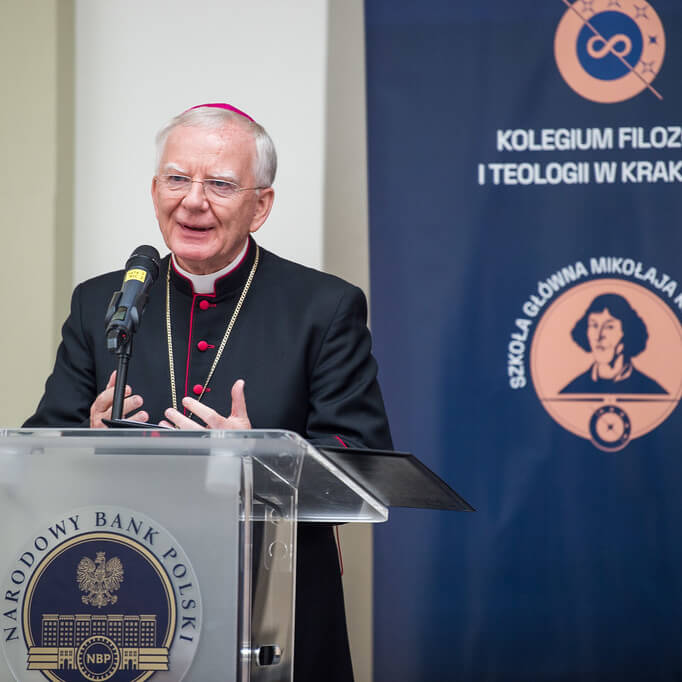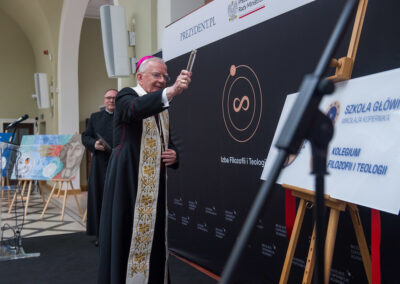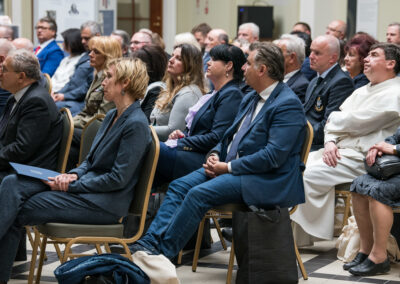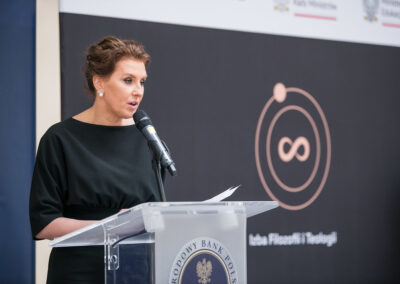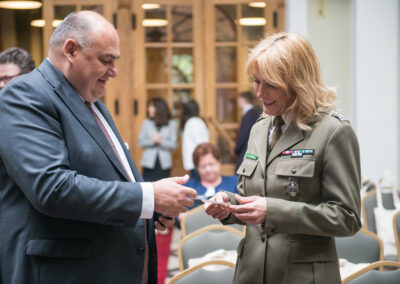‘I am deeply convinced that the opening of the College represents a great opportunity for the encounter between reason and faith, philosophy and theology to find answers to the anxieties of the modern world,’ said Krakow Metropolitan Archbishop Marek Jędraszewski at the opening ceremony of the College of Philosophy and Theology in Krakow.
On 25 May, the opening ceremony of the College of Philosophy and Theology at the Nicolaus Copernicus University was held at the premises of the National Bank of Poland in Krakow, hosted by Marzena Słupkowska of Polish Television.
The symbolic act of opening was performed by the Secretary General of the Copernicus Academy, Prof. Krzysztof Górski, PhD, the Rector of the Nicolaus Copernicus University, Prof. Leszek Markuszewski, PhD, the Director of the Copernicus Academy Office, Prof. Witold Mazurek, PhD, and the Dean of the College of Philosophy and Theology, Prof. Mirosław Lenart, PhD.
The College has its seat in the building of the Małopolska branch of the National Bank of Poland.
– ‘We want to create a platform that enables dynamic interaction between masters and their students, supporting our main goal – educating top-class scientists and conducting research and development work,’ explained Prof. Górski, Secretary General of the Copernican Academy, during the ceremony.
Prof. Glapinski: A breakthrough and a great opportunity for the development of Polish science
During the ceremony, Katarzyna Basiak-Gała, Director of the Regional Branch of the National Bank of Poland in Kraków, read out a letter from Professor Adam Glapiński. “The Copernicus Academy and the Nicolaus Copernicus University represent a breakthrough and a great opportunity for the development of Polish science”. – emphasised in his letter to the participants of the ceremony, a member of the Copernican Academy and President of the NBP.
“To this day, the foundation of all sciences still remains philosophy and theology, as both of these spheres touch on key aspects of our existence and place in the universe,” – Prof Glapinski pointed out in the letter.
“The Year of Nicolaus Copernicus, launched in Toruń three months ago, represents a great opportunity for us. We have been living in a free Poland for more than thirty years, but only now have we seen the creation of the first new university. This is a momentous occasion for both the Polish state and the academic community. The Copernicus Academy and the Nicolaus Copernicus University represent a breakthrough and a great opportunity for the development of Polish science,” he wrote. – The NBP President further wrote.
“We believe that the new institutions will leave as deep a mark as the Krakow Academy, or today’s Jagiellonian University, initiated centuries ago,” Prof Glapinski added.
Metropolitan of Krakow: “Interaction between reason and truth”.
During the ceremony, His Excellency Archbishop Marek Jędraszewski consecrated the College and the plaque. In his speech, the Metropolitan of Krakow emphasised that the new centre is a meeting place between two different fields.
– There is an interaction between reason and truth. – emphasised the hierarch – Man has the task of examining the truth with reason – explained Archbishop Jędraszewski, recalling the encyclical “Faith and Reason” by John Paul II.
– I am deeply convinced that the opening of the College is a great opportunity for the meeting of reason and faith in philosophy and theology to find answers to the anxiety of the contemporary world,’ the clergyman added.
Training at the College of Philosophy and Theology
The College of Philosophy and Theology, located in Kraków, will offer doctoral training within the framework of the Doctoral School, which is part of the Nicolaus Copernicus University.
The training programme offered to doctoral students is based on the principles of content diversity, methodological diversity, interdisciplinarity and an individualised model of academic care. Attention to Doctoral Students undertaking studies in the above-mentioned disciplines is connected with the proposal of joint work on the development of research competences and skills supporting conscious activity in communication processes, which support the ability to act in research teams.
The invitation to scholars to collaborate, especially those coming from abroad, is aimed at recreating the flow of intellectuals and ideas that was characteristic of the Middle Ages and which was the cause of a ferment never before recorded in Europe. It was based on a theological conception of existence, assuming that man must strive, using his intellect created in the image and likeness of the divine, to understand the premises God used in the work of creation.
You can see footage of the event in the material from TVP Kraków Chronicle.
